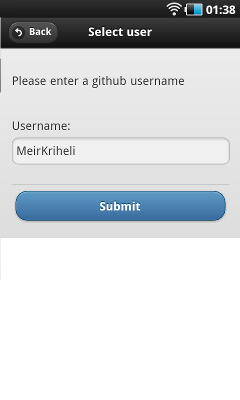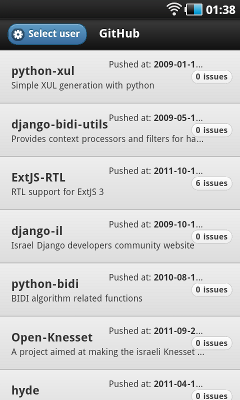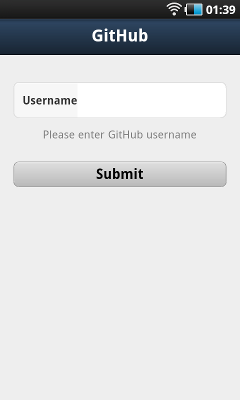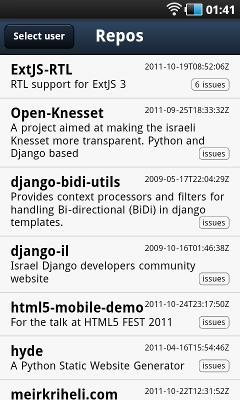Mobile Web Frameworks
HTML 5 Fest Oct. 2011
Html vs Native
- No access to hardware features
- With PhoneGap it can
- No need for multiple apps per platform
- Instant updates (No app store policies)
- Reuse html, css and JS knowledge
- Browser limits (e.g: cross domain)
Financial Times test case
- Apple takes 30% of subscription revenue
- Apple wants to control subscriber data (advertising)
- Pulled it from app store, rewritten with html 5
- More traffic compared to the native app
- Source: Reuters, FT Web-based app more popular than app sold in Apple store
Mobile frameworks features
- Lightweight (vs. full blown widget frameworks)
- Declarative (markup driven) configuration
- Native looking widgets
- Touch events
- Animations, Theming (it's css after all)
- Data integration (local storage, ajax etc..)
Our sample app
Git hub repositories viewer for a specific user.
Sample code at html5-mobile-demo repo on github:
jQuery mobile
- Dual license: MIT or GPL
- Declarative
- Pages, dialogs, toolbars, buttons, forms, lists
- Documentation: OK
- Unstable APIs in previous release (seems better since 1.0rc2 landed)
jQuery mobile


Demo
Sencha Touch
- License: GPL or Commercial
- Programmatic
- Documentation: Very Good
- Feature rich (Widgets and data, MVC)
- Webkit only
Sencha Touch


Demo
Sencha Touch
- Was a simple demo
- Provides all that's needed for an MVC apps
Dojo Mobile
- BSD or Academic Free License
- Declarative or programmatic
- Documentation: Usable, in flux
- Lots of things in flux 1.7 release (rc1 right now)
- Good extra tools (build, AMD format etc)
Dojo mobile

Demo
Dojo mobile
- There's also app and models
- things are in a flux
RTL supprot ?
- No way
- I Might add support to jquery-mobile if time permits
- In practice: When hell freezes over :(
Summary
| Framework | Widgets | MVC | Documentation | License |
|---|---|---|---|---|
| jQuery Mobile | Basic | No | Good | MIT/GPL |
| Sencha Touch | Rich | Yes | Very Good | GPLv3/Commercial |
| Dojo Mobile | Rich | In flux | Meh | BSD/Academic |
Links
- jQuery mobile, Docs and demos
- Dojo mobile, tutorial, showcase
- Sencha Touch, demos
- 10 Mobile Application Frameworks For Easy Development lists more frameworks
Contact
- Meir Kriheli
- http://meirkriheli.com
- mkriheli@gmail.com